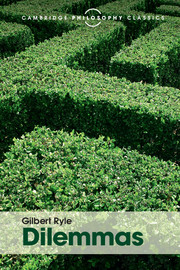6 - Technical and untechnical concepts
Published online by Cambridge University Press: 05 November 2015
Summary
Galileo, whose lead was quickly followed by Descartes and Newton, showed that a scientific theory has no place in it for terms which cannot appear among the data or the results of calculations. But colours, tastes, smells, noises and felt warmth and cold cannot, it seems, appear there. So there is no place for them in scientific theories. What the thermometer records has its place there, but not what the fingers or the lips register; the frequencies and amplitudes of the vibrations propagated through air, but not the notes that constitute heard melodies. To us it makes a big difference whether we are blind, colour-blind, or dazzled, and whether we look at things in sunlight or moonlight, through white glass or tinted glass; but the facts about light recorded and organized in the theory of optics are indifferent to these personal differences to us. The chemist, the geneticist and the wielder of the Geiger counter, in apparent defiance of this ostracism of sensible qualities, may indeed base their special theories on the smells and tastes of chemical compounds, on the colours of sweet-peas and on the clicks heard from the Geiger counter, but this does not suffice to reinstate these sensible qualities in the aristocracy of genuine physical facts. It shows only that they can, in certain conditions and when plenty of precautions are taken, be a reliable index to these facts, somewhat, perhaps, as a stomach-ache can be a reliable index to the presence of strychnine in the food consumed, though the food did not and could not incorporate any stomach-aches. Since scientific truths are about what can carry and be carried by calculations, colours, tastes and smells which cannot be so carried must belong not to the facts of physics, but elsewhere, namely either to the facts of human and animal physiology or to the facts of human and animal psychology. Colours are either in the eye of the beholder or else in the mind of the beholder. They are his rejected gift to the world. Here and here only can the iridescences of the bubble enjoy their slippery existence.
This doctrine has had a great influence and there is something in it which is true and important. It brings out into the open a fundamental logical property of the formulae that can be ingredients in an exact scientific theory.
- Type
- Chapter
- Information
- DilemmasThe Tarner Lectures 1953, pp. 70 - 78Publisher: Cambridge University PressPrint publication year: 2015

